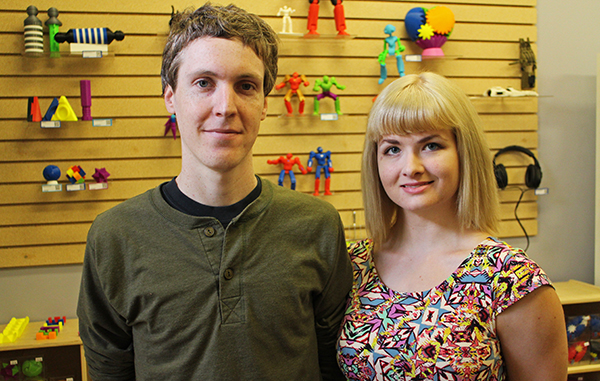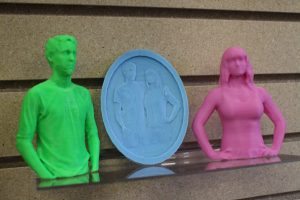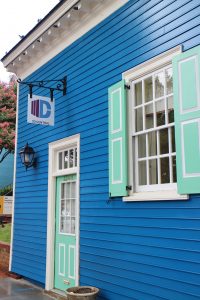
Chris Caswell and Cyndi Laird are opening a 3-D printing shop on Main Street. Photos by Michael Thompson.
A new retailer is firing up 3-D printers in the Fan.
3D Central is opening a storefront in August at 1308 W. Main St. It is taking over the 600-square-foot shop that was formerly home to Fan Guitar and Ukulele, which reopened in a bigger location a block east on West Main Street.
Husband-and-wife team Chris Caswell and Cyndi Laird launched the business in 2011 in Boston through the online marketplace Etsy. They’ve brought on friend Andrew Sink to help run the new store.
3D Central manufactures and sells 3-D printed objects, such as toys and fashion accessories, helps customers develop designs of their own, sells 3-D printers and parts and offers training in 3-D printing. It also offers scanning services.
“Our main part of the business is manufacturing open-source goods,” Caswell said. “Our flagship product is a pair of functioning headphones that we make mostly for people with single-sided hearing loss.”
While there are many types of printers, some more sophisticated than others, basic 3-D printers build products from the bottom up, putting down many thin layers of plastic or other material.
The prices for 3D Central’s products range from $8 for a “Legend of Zelda”-inspired key chain to an $80 set of those specialty headphones, which is the shop’s best-selling item. Printers range from $600 to $2,900.
Open-source designs are accessible to anyone and can be freely reproduced, changed, shared and monetized, unlike patented or copyrighted designs, which give owners exclusive rights.
Caswell said he likes the open-source model for both ideological and entrepreneurial reasons.
“I have my reservations about the patent system being inefficient in the economy,” he said.
Caswell said he isn’t against getting a patent. He said he likes Tesla’s stated practice of not filing patent lawsuits against anyone who uses the company’s technology in good faith.
He said being part of open-source sites like Thingiverse and Instructables has put him in touch with people who have lent a hand with 3D Central’s production and improved his designs.
Caswell said about half of the products 3D Central sells come from his shop’s own designs, and the other half come from other sources. As a small operation, 3D Central doesn’t have a large impact on the inventors of the open-source designs it uses, Caswell said.
Ten percent of the profit from the shop’s sale of an open-source product is sent back to whoever designed it, Caswell said. He said doing so is not required under open source rules.
Caswell was working as a data engineer and Laird was in the pharmaceuticals industry in Boston when they got into 3-D printing. The first thing Caswell successfully printed was a “Star Trek” badge.
He said people around his office noticed the trinkets he was producing and offered to pay for some of their own. Encouraged by the impromptu revenue stream, Caswell and Laird set up an online shop on Etsy called “Carry the What Replications.”
They said they moved to Richmond because the cost of living was less than in Boston and they were attracted to the area’s small business community.
Caswell said online sales will always be important to 3D Central’s business model, but he said getting products in front of people at festivals and events and at their new showroom in the Fan will help the business with outreach. The new storefront will be used to meet with clients interested in doing customized prototyping.
Caswell declined to discuss the cost of setting up the Fan location.
3D Central mostly prints with two types of plastic, Caswell said: petroleum-based ABS plastic – the same kind used to make Legos – and corn-based PLA plastic.
It takes about two to six hours to print a palm-sized item. The duration depends on the product’s complexity. A simple pencil holder, for example, doesn’t take as long as a 25-piece robot that needs to be snapped and glued together. Because many of the shop’s products can be customized, 3D Central keeps a limited inventory and prints the orders as they come in.
Caswell said he would eventually like to get into manufacturing electronics, a more elaborate process.
“The real utility of the machines comes from what they can make of value to consumers,” Caswell said. “It’s a nice novelty to have machines that can build stuff, but if it’s not useful things, it doesn’t have value.”

Chris Caswell and Cyndi Laird are opening a 3-D printing shop on Main Street. Photos by Michael Thompson.
A new retailer is firing up 3-D printers in the Fan.
3D Central is opening a storefront in August at 1308 W. Main St. It is taking over the 600-square-foot shop that was formerly home to Fan Guitar and Ukulele, which reopened in a bigger location a block east on West Main Street.
Husband-and-wife team Chris Caswell and Cyndi Laird launched the business in 2011 in Boston through the online marketplace Etsy. They’ve brought on friend Andrew Sink to help run the new store.
3D Central manufactures and sells 3-D printed objects, such as toys and fashion accessories, helps customers develop designs of their own, sells 3-D printers and parts and offers training in 3-D printing. It also offers scanning services.
“Our main part of the business is manufacturing open-source goods,” Caswell said. “Our flagship product is a pair of functioning headphones that we make mostly for people with single-sided hearing loss.”
While there are many types of printers, some more sophisticated than others, basic 3-D printers build products from the bottom up, putting down many thin layers of plastic or other material.
The prices for 3D Central’s products range from $8 for a “Legend of Zelda”-inspired key chain to an $80 set of those specialty headphones, which is the shop’s best-selling item. Printers range from $600 to $2,900.
Open-source designs are accessible to anyone and can be freely reproduced, changed, shared and monetized, unlike patented or copyrighted designs, which give owners exclusive rights.
Caswell said he likes the open-source model for both ideological and entrepreneurial reasons.
“I have my reservations about the patent system being inefficient in the economy,” he said.
Caswell said he isn’t against getting a patent. He said he likes Tesla’s stated practice of not filing patent lawsuits against anyone who uses the company’s technology in good faith.
He said being part of open-source sites like Thingiverse and Instructables has put him in touch with people who have lent a hand with 3D Central’s production and improved his designs.
Caswell said about half of the products 3D Central sells come from his shop’s own designs, and the other half come from other sources. As a small operation, 3D Central doesn’t have a large impact on the inventors of the open-source designs it uses, Caswell said.
Ten percent of the profit from the shop’s sale of an open-source product is sent back to whoever designed it, Caswell said. He said doing so is not required under open source rules.
Caswell was working as a data engineer and Laird was in the pharmaceuticals industry in Boston when they got into 3-D printing. The first thing Caswell successfully printed was a “Star Trek” badge.
He said people around his office noticed the trinkets he was producing and offered to pay for some of their own. Encouraged by the impromptu revenue stream, Caswell and Laird set up an online shop on Etsy called “Carry the What Replications.”
They said they moved to Richmond because the cost of living was less than in Boston and they were attracted to the area’s small business community.
Caswell said online sales will always be important to 3D Central’s business model, but he said getting products in front of people at festivals and events and at their new showroom in the Fan will help the business with outreach. The new storefront will be used to meet with clients interested in doing customized prototyping.
Caswell declined to discuss the cost of setting up the Fan location.
3D Central mostly prints with two types of plastic, Caswell said: petroleum-based ABS plastic – the same kind used to make Legos – and corn-based PLA plastic.
It takes about two to six hours to print a palm-sized item. The duration depends on the product’s complexity. A simple pencil holder, for example, doesn’t take as long as a 25-piece robot that needs to be snapped and glued together. Because many of the shop’s products can be customized, 3D Central keeps a limited inventory and prints the orders as they come in.
Caswell said he would eventually like to get into manufacturing electronics, a more elaborate process.
“The real utility of the machines comes from what they can make of value to consumers,” Caswell said. “It’s a nice novelty to have machines that can build stuff, but if it’s not useful things, it doesn’t have value.”

